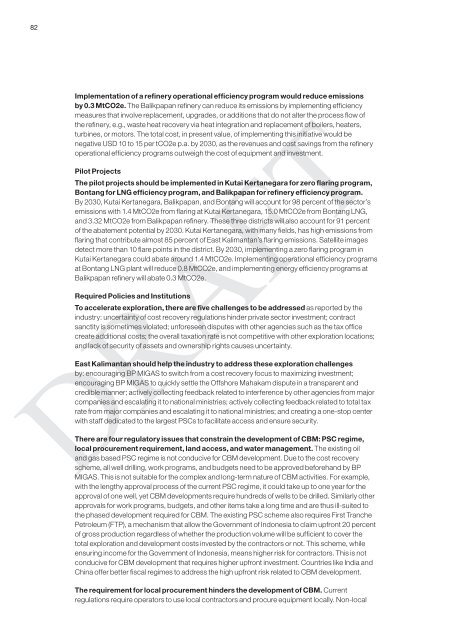East Kalimantan Environmentally Sustainable Development Strategy
East Kalimantan Environmentally Sustainable Development Strategy
East Kalimantan Environmentally Sustainable Development Strategy
Create successful ePaper yourself
Turn your PDF publications into a flip-book with our unique Google optimized e-Paper software.
82<br />
Implementation of a refinery operational efficiency program would reduce emissions<br />
by 0.3 MtCO2e. The Balikpapan refinery can reduce its emissions by implementing efficiency<br />
measures that involve replacement, upgrades, or additions that do not alter the process flow of<br />
the refinery, e.g., waste heat recovery via heat integration and replacement of boilers, heaters,<br />
turbines, or motors. The total cost, in present value, of implementing this initiative would be<br />
negative USD 10 to 15 per tCO2e p.a. by 2030, as the revenues and cost savings from the refinery<br />
operational efficiency programs outweigh the cost of equipment and investment.<br />
Pilot Projects<br />
The pilot projects should be implemented in Kutai Kertanegara for zero flaring program,<br />
Bontang for LNG efficiency program, and Balikpapan for refinery efficiency program.<br />
By 2030, Kutai Kertanegara, Balikpapan, and Bontang will account for 98 percent of the sector’s<br />
emissions with 1.4 MtCO2e from flaring at Kutai Kertanegara, 15.0 MtCO2e from Bontang LNG,<br />
and 3.32 MtCO2e from Balikpapan refinery. These three districts will also account for 91 percent<br />
of the abatement potential by 2030. Kutai Kertanegara, with many fields, has high emissions from<br />
flaring that contribute almost 85 percent of <strong>East</strong> <strong>Kalimantan</strong>’s flaring emissions. Satellite images<br />
detect more than 10 flare points in the district. By 2030, implementing a zero flaring program in<br />
Kutai Kertanegara could abate around 1.4 MtCO2e. Implementing operational efficiency programs<br />
at Bontang LNG plant will reduce 0.8 MtCO2e, and implementing energy efficiency programs at<br />
Balikpapan refinery will abate 0.3 MtCO2e.<br />
Required Policies and Institutions<br />
To accelerate exploration, there are five challenges to be addressed as reported by the<br />
industry: uncertainty of cost recovery regulations hinder private sector investment; contract<br />
sanctity is sometimes violated; unforeseen disputes with other agencies such as the tax office<br />
create additional costs; the overall taxation rate is not competitive with other exploration locations;<br />
and lack of security of assets and ownership rights causes uncertainty.<br />
<strong>East</strong> <strong>Kalimantan</strong> should help the industry to address these exploration challenges<br />
by: encouraging BP MIGAS to switch from a cost recovery focus to maximizing investment;<br />
encouraging BP MIGAS to quickly settle the Offshore Mahakam dispute in a transparent and<br />
credible manner; actively collecting feedback related to interference by other agencies from major<br />
companies and escalating it to national ministries; actively collecting feedback related to total tax<br />
rate from major companies and escalating it to national ministries; and creating a one-stop center<br />
with staff dedicated to the largest PSCs to facilitate access and ensure security.<br />
DRAFT<br />
There are four regulatory issues that constrain the development of CBM: PSC regime,<br />
local procurement requirement, land access, and water management. The existing oil<br />
and gas based PSC regime is not conducive for CBM development. Due to the cost recovery<br />
scheme, all well drilling, work programs, and budgets need to be approved beforehand by BP<br />
MIGAS. This is not suitable for the complex and long-term nature of CBM activities. For example,<br />
with the lengthy approval process of the current PSC regime, it could take up to one year for the<br />
approval of one well, yet CBM developments require hundreds of wells to be drilled. Similarly other<br />
approvals for work programs, budgets, and other items take a long time and are thus ill-suited to<br />
the phased development required for CBM. The existing PSC scheme also requires First Tranche<br />
Petroleum (FTP), a mechanism that allow the Government of Indonesia to claim upfront 20 percent<br />
of gross production regardless of whether the production volume will be sufficient to cover the<br />
total exploration and development costs invested by the contractors or not. This scheme, while<br />
ensuring income for the Government of Indonesia, means higher risk for contractors. This is not<br />
conducive for CBM development that requires higher upfront investment. Countries like India and<br />
China offer better fiscal regimes to address the high upfront risk related to CBM development.<br />
The requirement for local procurement hinders the development of CBM. Current<br />
regulations require operators to use local contractors and procure equipment locally. Non-local

















